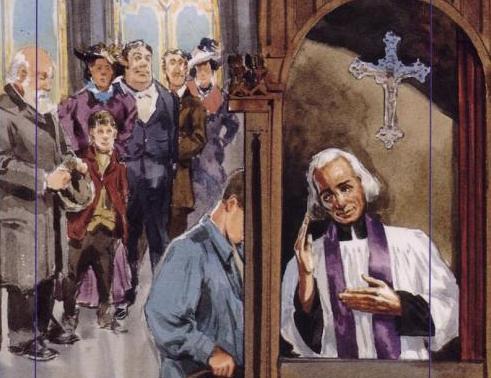ST. JOHN VIANNEY: THE PRIEST WHO DEVOTEDLY CURED “THE INCURABLE WOUNDS” OF SOULS AT THE CONFESSIONAL
First Reading: Jeremiah 30:1-2,12-15,18-22
Responsorial Psalm: 101(102):16-21,29,22-23
Gospel Reading: Matthew 15:1-2,10-14
__________________________________________
With original sin, human nature was wounded in all its dimensions. The man wounded by sin became subject and slave to his disordered passions, seeking joy and filling the emptiness of his heart, in the passing things of the world, which leads to profound injuries. However, God brought healing to the world through the death and resurrection of His beloved Son, our Lord Jesus Christ. Today’s liturgy and readings tell of God’s saving intention to heal our miserable souls wounded by sin through the Sacraments of the Church.
The subsequent verses following today’s first reading delineate the Prophet Jeremiah’s vocation in two ways: “to uproot and demolish … to build and plant” (cf. Jr 31, 28). In the first years of his mission, the prophet had, above all, to fulfil the first purpose: to proclaim messages of destruction. After the fall of Jerusalem, he accomplished the second purpose: to build and plant. This is what today’s first reading tend to illustrate. Following the destruction of Jerusalem and the ruin of the temple, the Jews found themselves in a situation without remedy – “an incurable wound,” as the Lord describes it: “Your wound is incurable, your injury past healing. There is no one to care for your sore, no medicine to make you well again.” Nevertheless, the Lord restores and revives the hope and confidence of His people through the prophet. Thus, the punishments they endured were not aimed at definitive destruction, but only to purify the people’s unfaithfulness to the Covenant. In order to free sinful Jerusalem, there was no other way but to allow its destruction. Once this had happened, it was possible to do a positive project. And God promises it: “Now I will restore the tents of Jacob, and take pity on his dwellings: the city shall be rebuilt on its ruins, the citadel restored on its site. From them will come thanksgiving and shouts of joy…” However, in order to receive this ‘cure,’ the prophet would later emphasize on the heart as the point of departure in verse 33ff: “But this is the covenant that I will make with the house of Israel after those days, says the Lord: I will put my law within them, and I will write it on their hearts, and I will be their God, and they shall be my people. No longer shall they teach one another, or say to each other, ‘Know the Lord,’ for they shall all know me, from the least of them to the greatest, says the Lord; for I will forgive their iniquity, and remember their sin no more.”
This prophecy reaches its fulfilment in the person of Christ. Little wonder in today’s gospel, Jesus focuses on the purification of the heart. Put differently, He seeks to give a “new heart” to His people. First, He criticized the Pharisees for paying more attention to the external – ceremonial laws, which were extrapolated from the Oral Traditions of the elders; as such, they honoured God with lips service but with a distant heart from God.
No matter how incurable the wounds we may have sustained through our sins, our Lord Jesus Christ comes to us heal our hearts and minds through the saving power of the Sacraments. The “Kyrie Eleison” (Lord have mercy) invoked at Mass to ask for the Lord’s mercy and compassion demonstrates this healing mission of Christ through the Sacraments. The Greek word “eleos”, translates itself as “mercy” in English. This word has the same ultimate root as the old Greek word for oil, or more precisely, olive oil; used extensively as a soothing agent for bruises and minor wounds. In those days, the oil was poured onto the wound and gently massaged in, thus soothing, comforting and making whole the injured part. “Eleos” and “mercy” is also translated in Hebrew to mean “hesed”, which could also denote “steadfast love”. Therefore, in chanting/saying the Greek words “Kyrie, Eleison” (Lord have mercy); we tend to say, ‘Lord, soothe me, comfort me, take away my pain, heal me, show me your steadfast love.’ This portrays the beauty and depth of God’s mercy – a loving God who wants to bind up our wounds like the divine Physician He is.
St. John Vianney, the saint we celebrate today – “Curé of Ars” (Priest of Ars), one of the greatest priests in the history of the Church, who spent close to forty years in the Parish of Ars, spending from thirteen to eighteen hours on a daily basis at the confessional, curing souls of their incurable wounds due to sin in reconciling them to God. This saint knew the extraordinary value of the priesthood; a good shepherd, a pastor of souls and a model of priests. May through his examples and intercessions, today’s priests would continually work tirelessly for the salvation of souls, bringing about the cure of every incurable wounds and defilement in the souls of men. Amen
Shalom!
© Fr. Chinaka Justin Mbaeri, OSJ
Paroquia Nossa Senhora de Fatima, Vila Sabrina, São Paulo, Brazil
nozickcjoe@gmail.com / fadacjay@gmail.com


